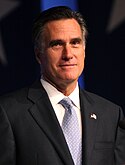2012 Republican Primary
|
|
|||||||||||||||||||||||||||||||||||||||||||||||
|---|---|---|---|---|---|---|---|---|---|---|---|---|---|---|---|---|---|---|---|---|---|---|---|---|---|---|---|---|---|---|---|---|---|---|---|---|---|---|---|---|---|---|---|---|---|---|---|
|
|||||||||||||||||||||||||||||||||||||||||||||||
|
|||||||||||||||||||||||||||||||||||||||||||||||

First place finishes by popular vote
|
|||||||||||||||||||||||||||||||||||||||||||||||

First place finishes by delegate allocation
|
|||||||||||||||||||||||||||||||||||||||||||||||

First place finishes by convention roll call
|
|||||||||||||||||||||||||||||||||||||||||||||||
|
|||||||||||||||||||||||||||||||||||||||||||||||
The 2012 Republican presidential primaries were the selection processes in which voters of the Republican Party elected state delegations to the Republican National Convention. The national convention then selected its nominee to run for President of the United States in the 2012 presidential election. There were 2,286 delegates chosen, and a candidate needed to accumulate 1,144 delegate votes at the convention to win the nomination. The caucuses allocated delegates to the respective state delegations to the national convention, but the actual election of the delegates were, many times, at a later date. Delegates were elected in different ways that vary from state to state. They could be elected at local conventions, selected from slates submitted by the candidates, selected at committee meetings, or elected directly at the caucuses and primaries.
The primary contest began in 2011 with a fairly wide field. Mitt Romney, former Governor of Massachusetts and the runner-up in the 2008 primaries, had been preparing to run for president ever since the 2008 election, and was from early on the favorite to win the nomination. However, he lacked support from the party's conservative wing and the media narrative became: "Who will be the anti-Romney candidate?" Several candidates rose in the polls throughout the year. However, the field was down to four candidates by February 2012: Former House speaker Newt Gingrich, U.S. Congressman Ron Paul, former Governor Romney and former U.S. Senator Rick Santorum. It was the first presidential primary to be affected by a Supreme Court ruling that allowed unlimited independent expenditures to support or oppose candidates through super PACs.
...
Wikipedia




